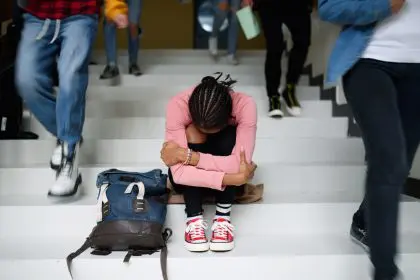Princeton University’s Dr. Eddie Glaude recently sat down with rolling out to share his thoughts on Mike Brown, Eric Garner and racism in America.
In the past two weeks, the nation has been rocked by the grand jury system in Missouri and New York that failed to indict the police officers who killed Mike Brown and Eric Garner. What have the last two weeks been like for you?
They’ve been a kind of roller coaster and tugging on a variety of levels of emotions. So the first thing involves my own worry as a parent. You know I have a young son who’s a freshman in college at Brown University. He had his own experience recently with the police in which his body was in the wrong space and they let him know that with their hands, and guns, and tasers. One type of response for all of this is concern for my child. I’m sure every black parent, mother and father out there, has a level of concern, that they’re worried about the safety of their child. The second level of concern was, I had been in Ferguson when all the lights were off. I went down to Ferguson for my own research and my own interest along with a colleague and we met with some of the extraordinary activists down there. They were preparing for what they called the Non-Decision. Of course I was worried about Black America generally. We had to bear so much over the years. Here you have a generation of young folk who are confronting the brutal reality and the brutal truth of white supremacy that white people have more power in this country than others.
We’re at a place where this almost seems like a cruel joke. What was the emotion that you felt after hearing the Eric Garner decision?
Rage. I just participated in a walkout with the students here at Princeton. It happened today. Just find some kind of way to give voice and expression to what’s going to be described as rage. Yesterday, I could not believe that the grand Jury had come to that conclusion. It proved, at least for me, that body cameras on police officers are not the answer. It’s something that cuts so much deeper. That in some ways it’s open season on black folks. So the reaction was just pure anger. That’s a human reaction. No matter how many letters you have behind your name, if you care about folks and care about Black folks, care about young folks, care about the state of your community and the state of the nation, then you need to be angry right now.
What are your thoughts on controversial comments by Charles Barkley and Dr. Ben Carson?
Two things happen almost simultaneously. One is I think their comments are silly. Their claim is silly. The second point is Black America is not monolithic. People have different views. People come to different conclusions for a variety of reasons given their interests and given their commitments. I’m not suggesting that we should all react similarly because we’re Black. That would be silly as well. One of the things I do suggest is that no matter what your political position, no matter what your ideological orientation happens to be, you need to look the facts squarely in the face and at least express deep empathy with those who feel a serious miscarriage of justice. Even if you disagree, be open to debate. Be sensitive to other people’s emotions. When Black folk gets angry, we step outside of the orbit of white folks expectations. Whenever Black people step out of the orbit of white people’s expectations is the threat of chaos. I loved Charles Barkley as a basketball player. But that doesn’t qualify him to be intelligent in nuance about political matters. But I think there should be some attempt to understand the degree of rage and anger. When you don’t have any kind of empathy, even when the facts are contested, even when you have contradictory testimony, contradictory forensic evidence, people are siding with authority and siding with power. They want to make that seem as if it is self-evident that it’s true. Then you just say Barkley just doesn’t know the facts. In terms of White cops are coming out here trying to kill Black folks. On a certain level, he’s just wrong. The same thing can be said about Dr. Ben Carson. Once people kind of hold these positions that you know are blatantly incorrect, then you have to say well what are your motivations? What are you trying to do at this point?
When the St. Louis Rams players showed support for Mike Brown, a group of police in St. Louis spoke out against their support. Are police across the nation not doing enough to speak out against the murders of unarmed Black men?
I think that people make the distinction that there are good cops and bad cops. But you have this kind of code, these people bleed blue. So you hear silence with regard to what arguably are just horrible acts on the part of their colleagues. I’ve heard, I’ve seen former law enforcement agents/officers say that what happened in Cleveland to Tamir Rice, police officers just driving straight up near the gazebo and just getting out of the car shooting, that it didn’t make any sense, that it’s bad training. In terms of the chokehold placed on Eric Garner, in terms of the odd number of officers used to bring him down and once you hear him say I can’t breathe, the fact that he didn’t relent was an example of bad training. See part of this has to do with the presumption that somehow because you have a badge because you’ve been authorized to use a gun or to protect and serve, that somehow you stop being human, that you can’t make mistakes, that you don’t have your own biases. We have officers running around here with PTSD trying to protect and serve. So part of what we have to remember is that officers are human beings and to the extent to which they are in stressful jobs, to the extent in some cases they are risking their lives. Those stresses can impact their judgment. It seems to me that if people were genuine, if people were serious, that they would be condemning it without hesitation. The athletes for the St Louis Rams came out with their hands up. That is 100 percent consistent with democracy, 100 percent consistent with free speech. The fact that the police department is trying to censor it suggests to me that for some people democracy has its limits.
















